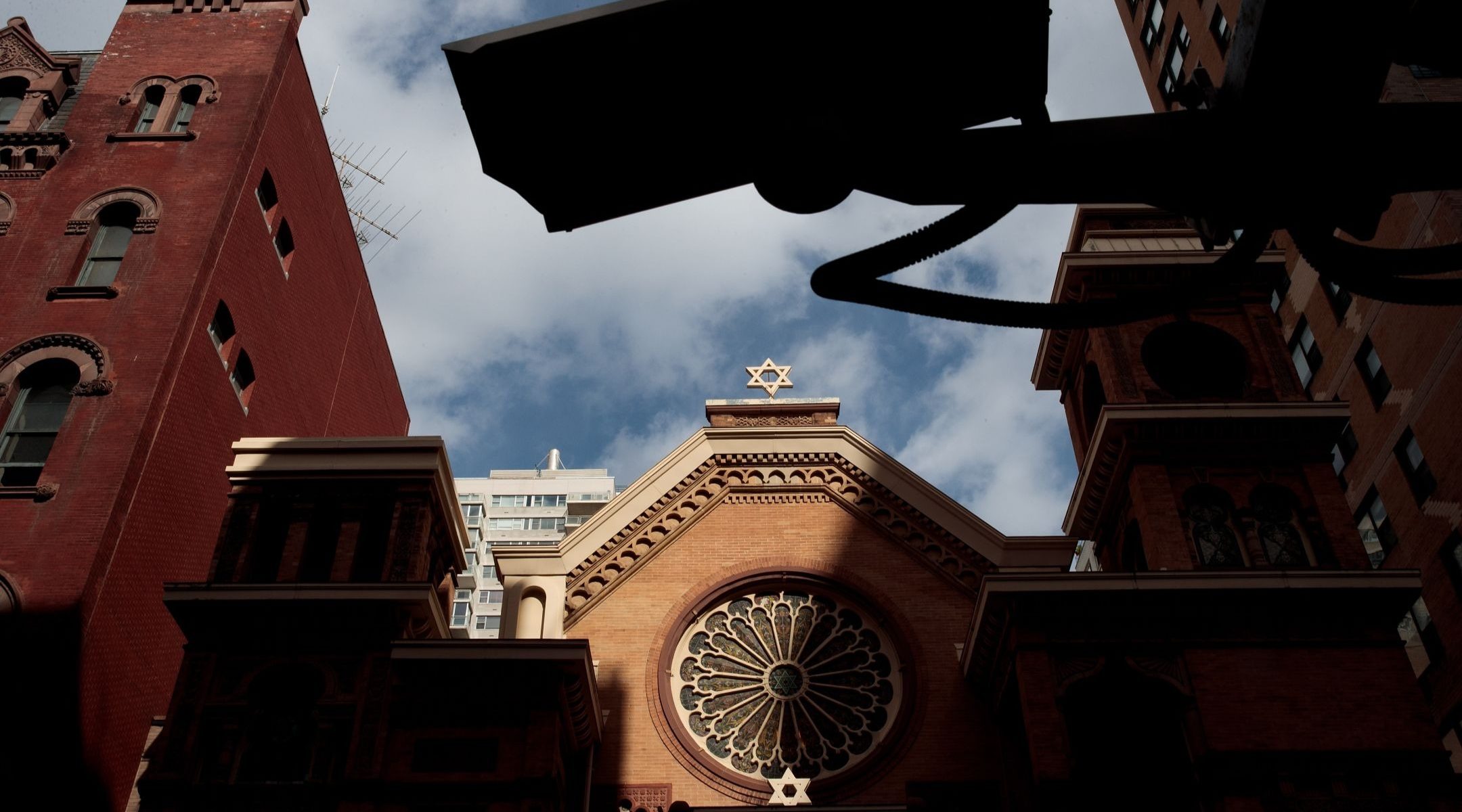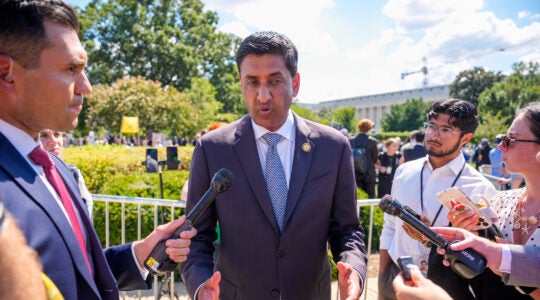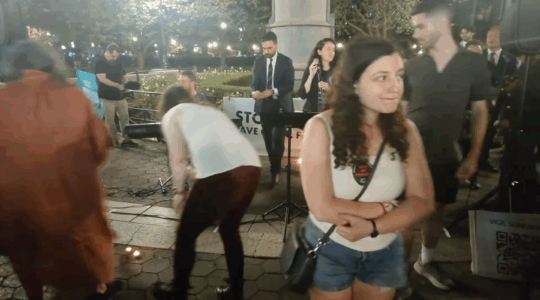With $274 million in federal security grants about to go up for grabs, dozens of progressive Jewish groups and several synagogues say they are boycotting the program.
In an open letter launched last week, they said they can’t accept the strings attached to the money, despite the risk of being targeted with violence. The letter comes in response to new requirements that grantees support federal immigration enforcement and avoid programs advancing diversity introduced earlier this year by the Department of Homeland Security.
“We are committed to upholding our communal values and will not comply with these repressive conditions,” reads the letter.
The letter arrives as some Jewish leaders press those in need of funds to apply, arguing that objections may be settled before recipients must formally agree to the conditions.
Many of the signatories are progressive groups, including Bend the Arc: Jewish Action and pro-Palestinian groups such as IfNotNow and Jewish Voice for Peace.
But they also include a handful of nonpartisan synagogues. Other synagogues independently have also decided to boycott the program as long as the controversial conditions are in place.
“Jewish safety requires inclusive democracy and inclusive democracy requires Jewish safety. We do not comply so we will not apply,” Jill Maderer, the senior rabbi at Rodeph Shalom in Philadelphia, posted on Facebook. She declined to be interviewed.
Meanwhile, one rabbi, facing what he described as a choice between his congregation’s safety and his sacred obligations, said he wishes to speak out. But he agreed to discuss the matter only anonymously, fearing that public protest could endanger two community members who are refugees.
“Money is being given to us on condition that we violate a specific mitzvah,” the rabbi said, referring to the religious commandment to welcome strangers. “I don’t see how we can possibly accept that money.”
Anxiety over the Nonprofit Security Grant Program, which Jewish groups have long sought to expand, represents the latest instance of some American Jews saying that Trump administration policies force their priorities and values into conflict. The unease is heightened by the administration’s chaotic rollout with mainstream Jewish organizations working intensely behind the scenes to shape the policies while offering a limited public response.
“Jewish Federations of North America strongly encourage institutions in our communities to apply for critical, life-saving Nonprofit Security Grant Program funds,” JFNA’s CEO, Eric Fingerhut, said in a statement. “We are working closely with DHS and stand ready to provide guidance to any institution seeking support around this process and raise any issues that come up along the way.”
A spokesperson for the organization, which represents 141 local Jewish federations, said officials there had come away from meetings with DHS optimistic that Jewish institutions would not need to compromise on their values to secure the security grants.
JFNA was a leading force in building the grant program, which is run by the Federal Emergency Management Agency under DHS. Created in 2004 and expanded after the Tree of Life synagogue shooting in 2018, it is the main federal source of money for houses of worship and nonprofits to bolster protection against terrorism and hate-motivated violence. Rising concerns about antisemitic attacks have sharply increased demand for the grants, for which Jewish groups have also encouraged other houses of worship to apply.
The grants can cover things like cameras, alarm and alert systems, hired guards, fencing and barriers, or screening tools such as metal detectors. They are meant to help nonprofits deemed at high risk of terrorist or extremist violence strengthen both physical and digital security.
Amy Spitalnick, CEO of the Jewish Council for Public Affairs, shares many of the concerns raised by groups to her left but is still urging congregational rabbis and lay leaders to apply. Submitting applications now, she says, gives communities time before deciding whether to accept the funds — time in which the Trump administration could yet rescind the controversial conditions.
“There is a deadline by which they have to apply, and the terms and conditions only kick in if you accept the funding, so there is still time,” she said.
On the conditions concerning immigration enforcement, the Trump administration might have already retreated, a development that isn’t yet widely understood in part because of confusing and contradictory messaging by the administration.
Since April, those closely observing the DHS communications have been whiplashed by conflicting directives, first exempting synagogues from immigration enforcement rules, then suggesting those rules still apply.
DHS had unveiled conditions that were said to apply to all DHS funding, part of a broader Trump administration effort to wield the federal bureaucracy for political purposes.
Soon after, 20 states filed a lawsuit arguing that it is illegal to condition government funding on assisting with federal immigration enforcement, handled through the agency known as ICE. One immediate impetus for the lawsuit was the worry that the Trump administration would withhold disaster recovery funds from victims of the devastating wildfires in Los Angeles earlier this year.
In a June 6 filing, federal lawyers defended the immigration-related conditions by saying they wouldn’t be applied to a range of grant programs including the one for securing nonprofits. Then, in late July, DHS appeared to confirm the exception when it gave official notice for this year’s nonprofit security grants.
The relief was short-lived because about two weeks later, on Aug. 13, DHS released another notice featuring new language that seemed to contradict the earlier exemption. The notice said the immigration conditions “may be material to the Department of Homeland Security’s decision to make this grant award, and the Department of Homeland Security may take any remedy for noncompliance.”
Spitalnick, whose team has been tracking the issue for months, communicating regularly with federal and state officials, said she was told the latest language is a mistake that will be corrected in a forthcoming notice.
She acknowledged how dizzying the bureaucracy can be for prospective applicants.
“We have heard extensive confusion and concern from national, state, and local Jewish and interfaith partners,” she said.
To clear things up — and because rules against diversity and inclusion work are firmly in place — Spitalnick on Friday sent a letter pleading with DHS Secretary Kristi Noem.
“The Jewish community is incredibly diverse — from LGBTQ+ Jews, to Jews of Color, to immigrant and refugee Jews,” she wrote to Noem. “Many synagogues and Jewish institutions host programs and services to engage and support these vital parts of our community, as well as to support and advance core Jewish values of justice, charity, and equity with our neighbors and in our broader communities and society.”
The letter continues, “Our communities desperately rely on this security funding — and they need clarity that what they are agreeing to in accepting these funds won’t force them to override their deeply held religious values and beliefs.”
It wouldn’t be the first time the Trump administration retreated after placing controversial conditions on government money. Earlier this year, the Trump administration floated a requirement that applicants for disaster relief funds pledge not to support boycotts of Israel. While that provision was withdrawn after legal and political pushback, vague language against “discriminatory prohibited boycott” still appears in broader DHS rules, leaving some uncertainty about enforcement.
DHS didn’t respond to specific questions from the Jewish Telegraphic Agency, instead releasing a statement saying the department “will no longer fund grant projects that don’t align with President Trump’s priorities.”
“Unlike the previous administration, grants will no longer be used to support DEI agendas, and illegal aliens in our country,” the statement says. “These Biden focused initiatives don’t serve the interest of the American People.”
Beyond Spitalnick and JCPA, many national Jewish organizations are not publicly engaging with the concern that, for some congregations, the Trump administration’s terms force the dilemma of choosing between security and conviction.
Two groups that have long championed the grant program, the Anti-Defamation League and Secure Community Network, didn’t respond to questions from JTA.
JTA has documented Jewish history in real-time for over a century. Keep our journalism strong by joining us in supporting independent, award-winning reporting.






